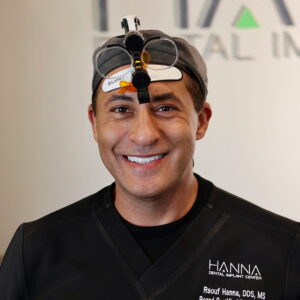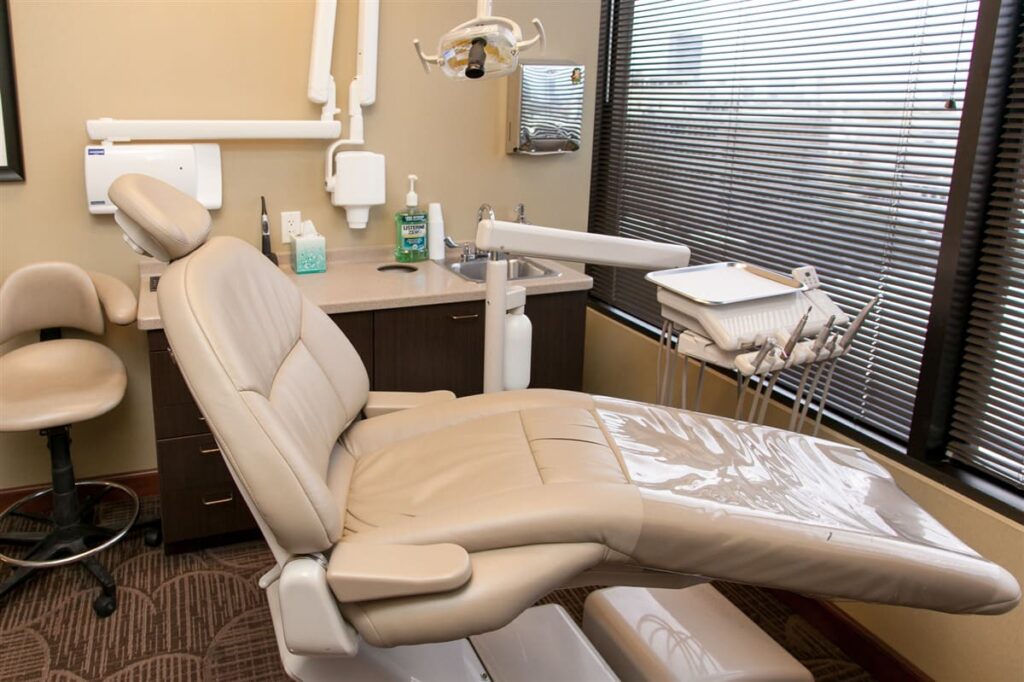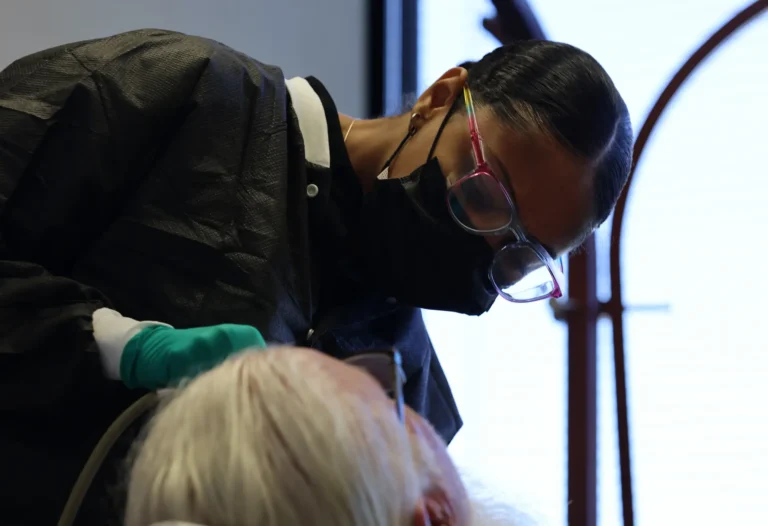A: Dental implants are basically a dental procedure to restore teeth that are missing. When we say the term “dental implant,” what we’re actually talking about is the screw—the implant portion, that goes into the bone. So, that’s stage one of what most people call dental implants because ultimately we have to restore that implant. So, once we know it’s anchored in, it’s in the right place in the bone and it’s going to hold—then we’ll come back and put a crown on top of that.
When people say dental implants it’s really a class of tooth restoration when you lose a tooth. There are actually different methods within the realm of dental implants in Houston. However, all of that aside, dental implants are a corrective procedure that replaces a missing tooth.
It’s not a restoration that is “kind of like a tooth” such as dentures or a bridge. Dental implants are a permanent solution and replace the form, function, and feel of natural teeth. The implant within “dental implants” is a titanium post that is surgically implanted into the jawbone. Then a crown (replacement tooth) that is made from porcelain or zirconia is placed on the post. It is lifelike and indistinguishable from a natural tooth in all aspects.
Why Should I Opt For Dental Implants In Houston?
Dental implants in Houston dental circles are the preferred method option for replacing a patient’s missing teeth. There’s good reason for it as well. Seeing as a dentist’s primary concern is to maintain or improve their patient’s quality of life—dental implants achieve that and more. Other options such as dentures provide a mediocre solution as they do not stimulate the jawbone leading to bone atrophy.
Jawbone atrophy leads to disintegration and can cause multitudes of bite issues and even cause existing dentures problems. Dental implants offer jawbone stimulation—a critical necessity to prevent disintegration. There’s also no adjustment needed with dental implants, they feel like your natural teeth and function like them too. No more sloppy adhesives, restrictive diets, or anxiety about them falling out mid-conversation.
Now, with dental implants, in Houston, some procedures differ when employing dental implants. Traditional dental implants require several office visits and are performed in phases. Other procedures such as the All on Four performed here at our facility, replace an entire arch in one day.
No matter which procedure you choose, the key advantage of dental implants for replacing missing teeth is the exact fit. They are a 1:1 replacement of the tooth you are replacing so there are no gaps, and no crowding of teeth either. Also, your jawbone integrity is not impacted, it remains strong, and you will have no facial appearance issues.
When the titanium post is implanted into your jawbone it serves as a root for the jawbone to bond with. Since titanium is biocompatible, the body accepts it as a natural root and doesn’t reject it. This results in a bonded implant that becomes part of the jawbone and creates a very secure base for your restoration.
Can I Get Dental Implants?
Except for extraordinary circumstances, dental implants are perfect for you if you:
- Suffer from one or multiple missing or failing teeth
- Have a fully developed jawbone that is healthy
- Posses adequate jawbone mass to secure dental implants or enough to build up with bone grafts
- Don’t have any gum tissue issues
- Have no medical conditions that could complicate healing
- Want to avoid dentures and have a fully functional smile
- Are willing to commit to the pre-op prep and recovery regimen
- Are not a tobacco user or are willing to cease for three months before surgery and after.
Preparing For Dental Implants In Houston
Since dental implants are an in-depth surgical procedure, you must undergo an in-depth evaluation to properly prepare including:
- Comprehensive Examination— This typically includes X-rays of your teeth and 3D images, as well as molds of your teeth and jaw, need to be made.
- Medical History Disclosure— This is critical— you need to tell the dentist about any medical conditions and medicines you take. This includes any over-the-counter medicines and vitamins/supplements. If you have certain conditions such heart conditions or diabetes, antibiotics before surgery might be in order.
- Customize Treatment Plan— Every patient is going to have different circumstances and needs. Therefore, a treatment plan needs to be designed specifically for your needs.
- Pain Management— Pain is very minimal with dental implants in Houston. However, to mitigate pain we use anesthesia or sedation. That is most often preferred by patients, rather than local anesthesia. However, that option is also available if you prefer local anesthesia. Whichever route you go, you need to bring someone with you to safely drive you home.
The Dental Implant Process
Dental implant surgery is usually an outpatient surgery with intermittent healing phases between the different stages. The steps of a dental implant procedure typically include:
- Extraction of failing teeth
- Bone grafting (if necessary)
- Placement of implant
- Healing period (osseointegration)
- Placement of abutment
- Crown installment
Except for All on Four type procedures which are completed in one day—the process can take a few months. However, most of that time is due to the healing period and allowing a strong bond between the jawbone and implant.
An In-Depth Look At The Procedure
At Comprehensive Dental Group, we believe an educated patient is critical to the success of a major procedure like this. The more you know about what to expect, the less anxious you will be and will understand the cautions as well.
Extracting The Teeth
This is an obvious step but one that needs to be covered regardless as you need to know what to expect. Your surgeon will carefully extract the tooth as well as clear out the surgical site of any excess tissue.
Placing The Dental Implant
The surgeon will make an incision into your gum to access the jawbone. A hole is drilled for the implant and the metal post is installed. Since it will act as the root, it’s placed deep into your jawbone.
Waiting For Osseointegration
When the implant is placed in your jawbone, your bone will bond with it in a process called osseointegration. This process is crucial as the stronger the bond, the better support your new teeth will have.
Abutment Placement
Once osseointegration is accomplished, it may be necessary to have minor additional surgery for the placement of the abutment. The abutment is the small piece that the crown will attach to permanently. The surgery is so minor for this phase that only local anesthetic is needed. After installation, your gums need to heal for about two weeks before the crown can be attached.
Crown Attachment
Pretty self-explanatory—the crown is placed and you can begin your post-op care.
Aftercare & Recovery
Whether you get traditional implants or the All on Four procedure completed in one day—there will be minor discomfort. Some of the conditions you may experience are:
- Swelling of the gums and/or face
- Bruising of the skin and face
- Minor pain at the implant site
- Minor bleeding at the implant site
Typically, the impact of these is reduced with OTC pain medicines such as Tylenol or Aleve. However, if the conditions worsen after a few days—call us ASAP.
You’ll also want to take it easy on your new teeth for comfort at first. Start with soft foods or liquid MREs, and avoid extremely hot or cold beverages.
Let Us Bring Your Smile Back!
At Comprehensive Dental Group, we enjoy the feeling our patients get when they see their new smile. Missing your teeth is very traumatizing so we feel privileged to be able to bring people happiness through a smile.
Contact us today and book your free consultation to see if dental implants are right for your situation.

Dr. Raouf Hanna is a double board-certified specialist recognized worldwide for his expertise in dental implantology. With advanced training and decades of experience, he has restored countless smiles through procedures ranging from single implants to full-arch restorations. His focus on precision, innovation, and patient-centered care ensures exceptional results for every case.
In addition to his clinical work, Dr. Hanna is a respected educator and former Clinical Associate Professor of Periodontics at the University of Texas. He has contributed significantly to the advancement of implant dentistry through his teaching, research, and development of multiple patented technologies that have significantly influenced modern treatment techniques.
At The Comprehensive Dental Group of Houston, Dr. Hanna combines his surgical skill with state-of-the-art technology to help patients achieve lasting, natural-looking results.





